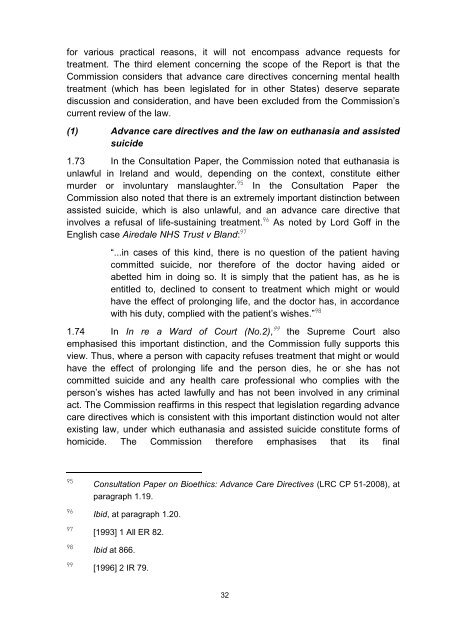Report on Bioethics: Advance Care Directives - Law Reform ...
Report on Bioethics: Advance Care Directives - Law Reform ...
Report on Bioethics: Advance Care Directives - Law Reform ...
Create successful ePaper yourself
Turn your PDF publications into a flip-book with our unique Google optimized e-Paper software.
for various practical reas<strong>on</strong>s, it will not encompass advance requests fortreatment. The third element c<strong>on</strong>cerning the scope of the <str<strong>on</strong>g>Report</str<strong>on</strong>g> is that theCommissi<strong>on</strong> c<strong>on</strong>siders that advance care directives c<strong>on</strong>cerning mental healthtreatment (which has been legislated for in other States) deserve separatediscussi<strong>on</strong> and c<strong>on</strong>siderati<strong>on</strong>, and have been excluded from the Commissi<strong>on</strong>‘scurrent review of the law.(1) <strong>Advance</strong> care directives and the law <strong>on</strong> euthanasia and assistedsuicide1.73 In the C<strong>on</strong>sultati<strong>on</strong> Paper, the Commissi<strong>on</strong> noted that euthanasia isunlawful in Ireland and would, depending <strong>on</strong> the c<strong>on</strong>text, c<strong>on</strong>stitute eithermurder or involuntary manslaughter. 95 In the C<strong>on</strong>sultati<strong>on</strong> Paper theCommissi<strong>on</strong> also noted that there is an extremely important distincti<strong>on</strong> betweenassisted suicide, which is also unlawful, and an advance care directive thatinvolves a refusal of life-sustaining treatment. 96 As noted by Lord Goff in theEnglish case Airedale NHS Trust v Bland: 97―...in cases of this kind, there is no questi<strong>on</strong> of the patient havingcommitted suicide, nor therefore of the doctor having aided orabetted him in doing so. It is simply that the patient has, as he isentitled to, declined to c<strong>on</strong>sent to treatment which might or wouldhave the effect of prol<strong>on</strong>ging life, and the doctor has, in accordancewith his duty, complied with the patient‘s wishes.‖ 981.74 In In re a Ward of Court (No.2), 99 the Supreme Court alsoemphasised this important distincti<strong>on</strong>, and the Commissi<strong>on</strong> fully supports thisview. Thus, where a pers<strong>on</strong> with capacity refuses treatment that might or wouldhave the effect of prol<strong>on</strong>ging life and the pers<strong>on</strong> dies, he or she has notcommitted suicide and any health care professi<strong>on</strong>al who complies with thepers<strong>on</strong>‘s wishes has acted lawfully and has not been involved in any criminalact. The Commissi<strong>on</strong> reaffirms in this respect that legislati<strong>on</strong> regarding advancecare directives which is c<strong>on</strong>sistent with this important distincti<strong>on</strong> would not alterexisting law, under which euthanasia and assisted suicide c<strong>on</strong>stitute forms ofhomicide. The Commissi<strong>on</strong> therefore emphasises that its final9596979899C<strong>on</strong>sultati<strong>on</strong> Paper <strong>on</strong> <strong>Bioethics</strong>: <strong>Advance</strong> <strong>Care</strong> <strong>Directives</strong> (LRC CP 51-2008), atparagraph 1.19.Ibid, at paragraph 1.20.[1993] 1 All ER 82.Ibid at 866.[1996] 2 IR 79.32
















